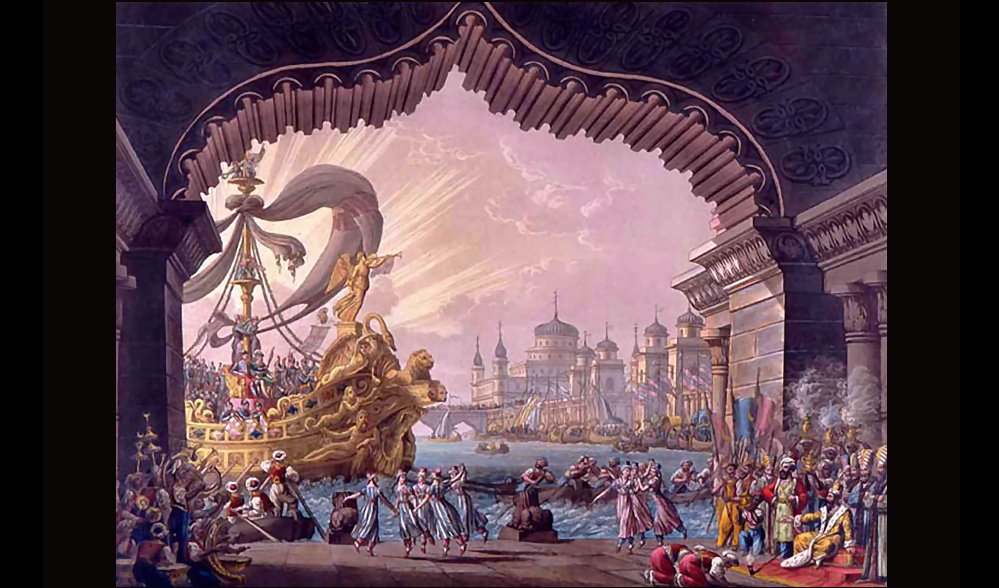Opera can be almost anything. “Grand opéra” is something specific, and apart from one highly-specific example, chances are you’ve never seen one live. The exception is Aïda, with its exalted emotions, imperial politics, elephants, parades, and exotic dances. If only it included one collapsing palace or erupting volcano it would be the perfect example.
From 1830 to around 1875, grand opera was the most-admired kind of musical theater in the western world, and its home base was the Palais Garnier in Paris. The pressure was terrific. Rossini threw in the towel in 1829 at the age of 37 and retired from composing for the public after William Tell. Wagner went snarling back to Germany after Tannhaeuser flopped in 1861.
But no genre rules the stage forever. Audiences and tastes change. By 1870 grand opéra had become a dry and hugely formulaic enterprise ruled by dramatic clichés and was hugely expensive, to boot. It had evolved into a mechanical formula just waiting to be replaced in the public taste.
By the time Camille Saint-Saëns got serious about composing Samson et Dalilah in 1877, grand opéra had already received its death blow, though nobody realized yet that the perky, melodious little opéra comique named Carmen was really an assassin.
Samson had a prolonged and troubled gestation. As a composer Saint-Saëns had more in common with the preceding generations of German composers like Liszt and Mendelssohn who leant more into “pure music” and religious themes than staged carnal drama. He originally planned Samson as an oratorio until a nephew suggested the operatic form. He gave private auditions of bits of it as he wrote it, but they weren’t private enough to avoid hostile publicity about the work’s dependence on extensive (and unfashionable) choral passages and (controversial) religious subject matter.
That it was finished at all was due to Liszt’s offer to stage its premiere—in German—at the grand-ducal opera house in Weimar. It was reasonably successful there but met with no interest at all among French opera producers. It wasn’t until 1890–nearly 25 years after its conception and with grand opéra a sterile fossil–that it found success in France and round the world: as a not-too-grand vehicle for star singers like Caruso and, in our day, Placido Domingo. The Paris Opéra alone has presented it more than 500 times.
The paradox of Samson et Dalila is one of a show that wasn’t showy enoughy to please when it was newish and is now too costly to produce even for the Metropolitan Opera without headliner singers (Roberto Alagna and Elena Garança last time out). So what’s it doing in the season of a financially-stretched provincial house like Seattle Opera?
The answer is that it’s just one example of the artistico-financial jiu jitsu displayed by the administration of general director Christina Scheppelmann. In short: the virtue of your limitations. Can’t afford a full staging of Samson, let alone bankable vocalists? Then leave setting the scene to a first-rate orchestra led by an energetic and probing conductor (Ludovic Morlot). Cast the star roles with debutants, but debutants of extraordinary promise, like J’nae Bridges, subject of a Metropolitan Opera Magazine cover feature, and on an upward trajectory at 33; and Yonghoon Lee, coming new to the role of Samson as an international star in the romantic-tenor repertory for two decades. Instead of spending most of weeks of rehearsal on learning where to stand and move and pretend not to look at the conductor, put the score in their hands concentrate on letting their voices do the acting.
“Concert performance,” presenting opera without stage machinery or costumery, is an honored tradition on the orchestral platform. It is more rarely practiced by opera companies but is bound to increase as the sheer expense of assembling the necessary components of the grander exempla of the operatic repertory.
The Metropolitan Opera just succeeded this season in a creditable more-or-less complete mounting of Verdi’s Don Carlo. But it is not something we are likely to see or hear again in the foreseeable future. Even in still heavily-subsidized Europe, grandeur is often no longer an option. Marc Minkowski’s recording of the first and still most-famous grand opéra, Giacomo Meyerbeer’s Robert le diable of 1830, is on many 10-Best lists this year. Rather than the record of a full staged performance, it was recorded at in concert-version at the National Bordeaux Aquitaine.
So as you listen to Samson et Dalilah next weekend, spare a thought: Isn’t three-quarters of an opera better than no opera at?
Discover more from Post Alley
Subscribe to get the latest posts sent to your email.

Very interesting. The reasons it gives for a concert performance of this fine opera are good, and since the work was originally conceived by its composer as an oratorio rather than a staged opera, this upcoming Seattle Opera event may fully deliver its originally intended effects and will be very worthwhile to attend.
Tom Luce
For me, “Robert le diable” is significant because of the Ballet of the Nuns, which was the first real example of Romantic ballet. I’m sure the concert version is indeed all that, but I’m glad that, at least in 1830, there was that fully-staged production.
I admire the Seattle Opera for adjusting to these new times by doing more intimate productions and concert versions. The value of the smaller productions is wider repertoire, seeing the singers’ faces, and letting the singers use natural voice. Opera has always enjoyed an advantage in being able to dial back costs (staging, singers, chorus, stars) to roll with the financial punches. Also, the local opera company will be able to put more product on the stages and be more present in the mind of the audiences; and to introduce new singers. Bravo!